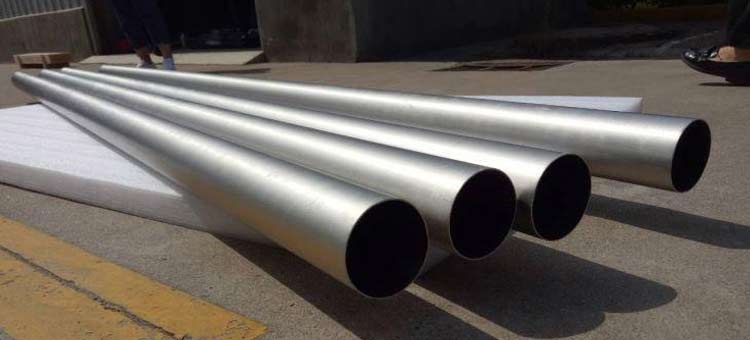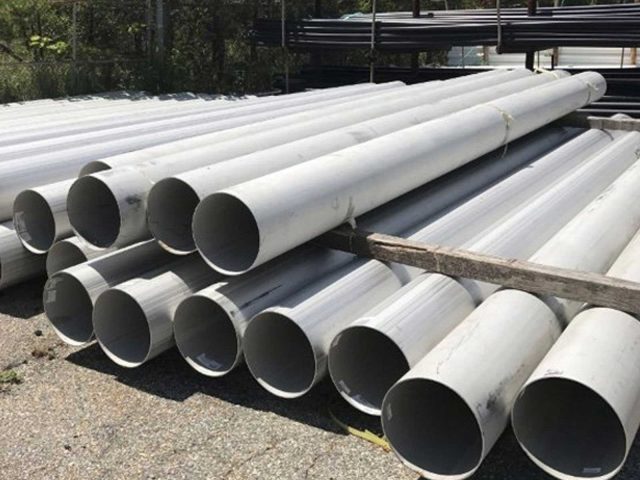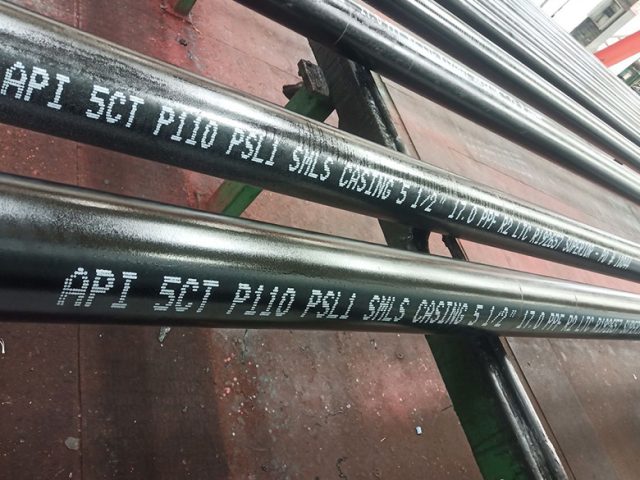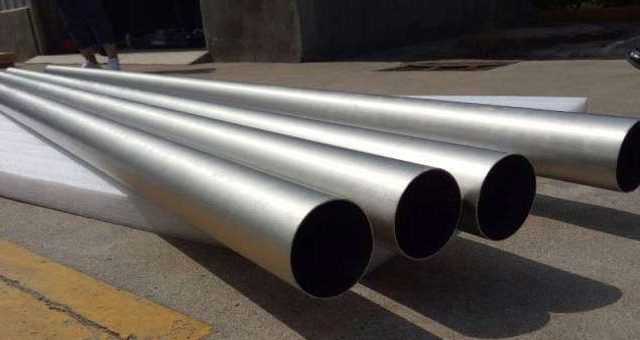ASTM B861 ,ASTM B862 ,ASTM B338 ,Titanium & Titanium Alloy Steel Pipe

ASTM B861, ASTM B862, ASTM B338: A Comprehensive Guide to Titanium and Titanium Alloy Pipes
Titanium and titanium alloy pipes are widely used in various industries due to their exceptional properties and performance. In this comprehensive guide, we will explore the standards ASTM B861, ASTM B862, and ASTM B338, which provide specifications for titanium and titanium alloy pipes. We will also discuss the properties, applications, and advantages of these pipes.
ASTM B861: Standard Specification for Titanium and Titanium Alloy Seamless Pipe
ASTM B861 is a standard specification that covers seamless pipes made from titanium and titanium alloys. This specification outlines the requirements for chemical composition, mechanical properties, dimensions, and tolerances of the pipes. It also provides guidelines for heat treatment and testing procedures.
The seamless pipes manufactured according to ASTM B861 are known for their high strength, corrosion resistance, and lightweight nature. They find applications in industries such as aerospace, chemical processing, marine, and medical.
ASTM B862: Standard Specification for Titanium and Titanium Alloy Welded Pipe
ASTM B862 is a standard specification that covers welded pipes made from titanium and titanium alloys. This specification outlines the requirements for chemical composition, mechanical properties, dimensions, and tolerances of the pipes. It also provides guidelines for heat treatment and testing procedures.
The welded pipes manufactured according to ASTM B862 offer excellent corrosion resistance, high strength, and durability. They are commonly used in industries such as power generation, oil and gas, automotive, and architectural.
ASTM B338: Standard Specification for Seamless and Welded Titanium and Titanium Alloy Tubes for Condensers and Heat Exchangers
ASTM B338 is a standard specification that covers seamless and welded tubes made from titanium and titanium alloys. This specification specifically focuses on tubes used in condensers and heat exchangers. It outlines the requirements for chemical composition, mechanical properties, dimensions, and tolerances of the tubes. It also provides guidelines for heat treatment and testing procedures.
The tubes manufactured according to ASTM B338 are designed to withstand high-temperature and corrosive environments. They offer excellent heat transfer properties, corrosion resistance, and reliability. They are widely used in industries such as chemical processing, power generation, desalination, and HVAC (heating, ventilation, and air conditioning) systems.
Properties of Titanium and Titanium Alloy Pipes
Titanium and titanium alloy pipes exhibit several properties that make them highly desirable in various industries. Here are some key properties of these pipes:
- Corrosion Resistance: Titanium and titanium alloys offer exceptional resistance to corrosion in various environments, including seawater, acids, and alkaline solutions. This makes them suitable for applications where corrosion is a concern.
- High Strength: Titanium and titanium alloys have high strength-to-weight ratios, making them strong yet lightweight materials. This property allows for the design of structures and components that require both strength and reduced weight.
- Excellent Biocompatibility: Titanium and certain titanium alloys are biocompatible, meaning they are well-tolerated by the human body. This makes them suitable for medical and dental applications, such as implants and prosthetics.
- Low Density: Titanium and titanium alloys have low densities, making them lightweight materials. This property is advantageous in applications where weight reduction is critical, such as aerospace and automotive industries.
- Good Weldability: Titanium and titanium alloys can be easily welded using various techniques, including gas tungsten arc welding (GTAW) and electron beam welding (EBW). This allows for easy fabrication and installation of pipes and tubes.
- Excellent Heat Transfer: Titanium and titanium alloy pipes have high thermal conductivity, allowing for efficient heat transfer. This property is beneficial in applications such as condensers and heat exchangers.
- Low Thermal Expansion: Titanium and titanium alloys have low coefficients of thermal expansion, meaning they expand and contract less with temperature changes. This property reduces the risk of thermal stress and distortion in piping systems.
Applications of Titanium and Titanium Alloy Pipes
Titanium and titanium alloy pipes find applications in various industries due to their unique properties. Here are some common applications of these pipes:
- Aerospace: Titanium and titanium alloy pipes are extensively used in the aerospace industry for applications such as aircraft frames, landing gear components, and engine parts. Their high strength, lightweight nature, and corrosion resistance make them ideal for aerospace applications.
- Chemical Processing: Titanium and titanium alloy pipes are used in chemical processing plants for applications such as piping systems, heat exchangers, and reactors. Their corrosion resistance and compatibility with corrosive chemicals make them suitable for handling acids, alkalis, and other corrosive media.
- Medical and Dental: Titanium and certain titanium alloy pipes are used in the medical and dental fields for applications such as implants, prosthetics, and surgical instruments. Their biocompatibility, corrosion resistance, and strength make them ideal for thesespecialized applications.
- Oil and Gas: Titanium and titanium alloy pipes are utilized in the oil and gas industry for applications such as offshore platforms, subsea pipelines, and downhole equipment. Their corrosion resistance and high strength make them suitable for harsh environments and corrosive fluids.
- Desalination: Titanium and titanium alloy pipes are used in desalination plants for applications such as seawater intake and brine discharge systems. Their corrosion resistance and compatibility with seawater make them ideal for desalination processes.
- Power Generation: Titanium and titanium alloy pipes are employed in power generation facilities for applications such as heat exchangers, condensers, and piping systems. Their corrosion resistance, high strength, and heat transfer properties make them suitable for power generation processes.
- Automotive: Titanium and titanium alloy pipes are utilized in the automotive industry for applications such as exhaust systems and suspension components. Their high strength-to-weight ratio and corrosion resistance contribute to improved performance and fuel efficiency.
Advantages of Titanium and Titanium Alloy Pipes
The use of titanium and titanium alloy pipes offers several advantages over other materials. Here are some key advantages:
- Corrosion Resistance: Titanium and titanium alloys exhibit exceptional resistance to corrosion, outperforming many other materials. This property ensures the longevity and reliability of piping systems in corrosive environments.
- High Strength-to-Weight Ratio: Titanium and titanium alloys possess high strength-to-weight ratios, making them stronger and lighter than many other materials. This advantage allows for the design of structures and components that are both strong and lightweight.
- Longevity: Titanium and titanium alloy pipes have excellent durability and resistance to degradation, resulting in long service life. This reduces maintenance and replacement costs over time.
- Biocompatibility: Certain titanium alloys are biocompatible, meaning they are well-tolerated by the human body. This property is crucial for medical and dental applications, ensuring compatibility and minimizing the risk of adverse reactions.
- Heat Transfer Efficiency: Titanium and titanium alloy pipes have high thermal conductivity, allowing for efficient heat transfer. This advantage is beneficial in applications where heat exchange is critical, such as condensers and heat exchangers.
- Ease of Fabrication: Titanium and titanium alloys can be easily fabricated and formed into pipes and tubes using various techniques. This ease of fabrication contributes to cost-effective manufacturing processes.
- Environmental Sustainability: Titanium is a highly recyclable material, and the production of titanium pipes has a lower environmental impact compared to other materials. This makes titanium pipes a sustainable choice for various industries.
Frequently Asked Questions (FAQ)
Q1: What are the main differences between ASTM B861 and ASTM B862?
A1: ASTM B861 covers seamless pipes made from titanium and titanium alloys, while ASTM B862 covers welded pipes made from the same materials. The main difference lies in the manufacturing process, with seamless pipes being produced without any welding and welded pipes being fabricated by joining sections together.
Q2: Can titanium and titanium alloy pipes be used in high-temperature applications?
A2: Yes, titanium and titanium alloy pipes can withstand high temperatures, making them suitable for various high-temperature applications. However, it is essential to consider the specific alloy and its temperature limitations for each application.
Q3: Are titanium and titanium alloy pipes expensive compared to other materials?
A3: Titanium and titanium alloy pipes can be more expensive than some other materials due to the cost of raw materials and the specialized manufacturing processes involved. However, their long service life, corrosion resistance, and other advantages often justify the higher initial investment.
Q4: Can titanium and titanium alloy pipes be welded?
A4: Yes, titanium and titanium alloy pipes can be welded using various techniques, including gas tungsten arc welding (GTAW) and electron beam welding (EBW). It is essential to follow proper welding procedures and use appropriate filler materials to ensure the integrity of the weld joint.
Q5: What are the typical inspection and testing methods for titanium and titanium alloy pipes?
A5: Typical inspection and testing methods for titanium and titanium alloy pipes include visual inspection, dimensional inspection, ultrasonic testing, hydrostatic testing, and chemical analysis. These tests ensure the quality and compliance of the pipes with the specified standards.





2 comments
mnogofakto_ixen
2024年3月23日 at pm8:04
What is the ASME Code for titanium pipe?
Ronsun2023
2024年3月24日 at pm12:52
ASME SB-862
Identical to ASTM B862, ASME SB-862 is the standard specification for Titanium and Titanium alloy welded pipes intended for general corrosion resisting and elevated temperature service. This specification covers 33 grades of Titanium and Titanium alloys.